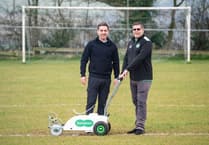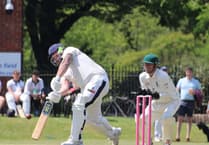As part of their Think Of A Fan campaign, the Toolstation Western League have featured an interview with mental health charity, Mind, on their weekly podcast.
Tom Hore, a Director of Bristol Mind spoke with Ian Nockolds about the relationship between football and mental health and the work that Mind have done nationally with the professional game to encourage men, in particular, to talk about how they are feeling.
For the last two years, Mind and the English Football League have entered into a partnership to create a space for discussions about mental health. The Mind logo has featured on the backs of players’ shirts in the Championship, League One and League Two.
Different Clubs, including Bristol Rovers, have worked with Mind to stage different events, from bucket collections to fans’ forums, where people can talk openly about mental health.
Speaking about the link between football and mental health, Tom said; “I’m a Coventry fan, I’ve been a Coventry fan for over fifty years, and it’ll be the one constant throughout my whole life.
“People change their relationships, their bank accounts, all those sort of things, more often than their football clubs. For a lot of people, football does play an enormous part in their life, they remember things that have happened to them in their life in connection with different matches. And I think it is a place where people go, and they share, in those two hours that they’re there; they share a bond with all of those people around them, even if they’re on their own.”
“I saw a statistic that said that 40% of men wouldn’t go and seek any sort of support unless they had actively thought about suicide, which is quite a shocking figure.
“I think one of the big messages for all men is that it’s okay to not be okay and I think within football over the last year, there has been an increasing number of footballers who have talked about their own depression; Danny Rose, Peter Crouch, and Lee Hendrie. There’s been an increasing number of players who’ve acknowledged it and found a voice to talk about it, which I think is enormously helpful.
“If these people who we look up to, have these problems and can say, I’m not okay and I need some help, I think it makes it easier for people like me to say that too.
“At Bristol Mind, we have a telephone helpline, it’s open every evening, from 7 pm until 11 pm. It’s a freephone. Anyone can call, it’s completely anonymous. You can talk to somebody about anything that’s bothering you.
“People ring and talk about relatives who are going through problems or friends who are going through problems and they want to know how they might support them. We also run a counselling service and various sorts of advocacy services to try to support people to get the sort of services and treatment that they might need. We run a mental health hate crimes service, which acts on behalf of people who are victimised due to their mental health. We also do a wide range of training and give talks to businesses, community organisations in and around the community.
“More people are feeling lonely, are feeling isolated. We’ve noticed an increase in the number of people who feel anxious. Anxiety about the situation currently, about the future. When will we go back to some sort of normal way of life?
“There are a lot of people who are anxious about their employment, about their housing situation. So there has been a generalised increase, inevitably, also among young people and children and an increase in potentially difficult behaviours, which may manifest themselves later in some sort of way around mental health.
“Children and young people have been massively affected as well with the withdrawal of grassroots sport, grassroots football.
“I’m involved as an Under-12’s coach, and after the first lockdown, we had players who didn’t return, their parents said that they had lost interest. That’s a real risk, as obviously sport and physical activity are great for our mental health. People can really immerse themselves in organised team sports, even if only for an hour or so a week – it can have an enormous impact.”
The Toolstation Western League is urging anyone struggling with their mental health to visit www.mind.org.uk/ or call: 0300 123 3393. Mind operate a network of around 125 local Minds, including Bristol, Bath, Somerset, Devon, Dorset and Wiltshire which offer support to anyone, including football fans, with their mental health. The full interview with Bristol Mind can be heard on this week’s Toolstation Western League podcast, available at:
toolstationleague.com/





Comments
This article has no comments yet. Be the first to leave a comment.